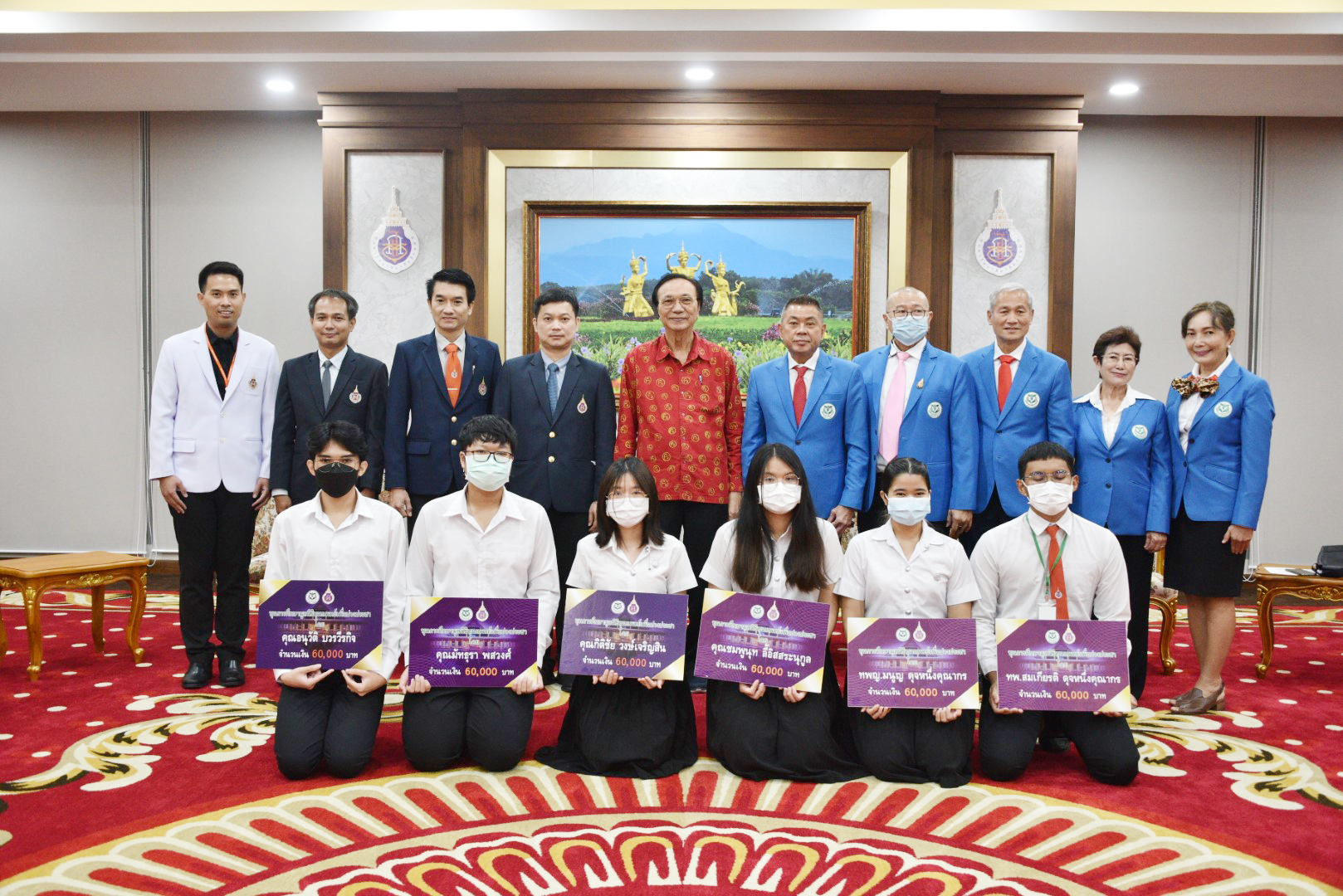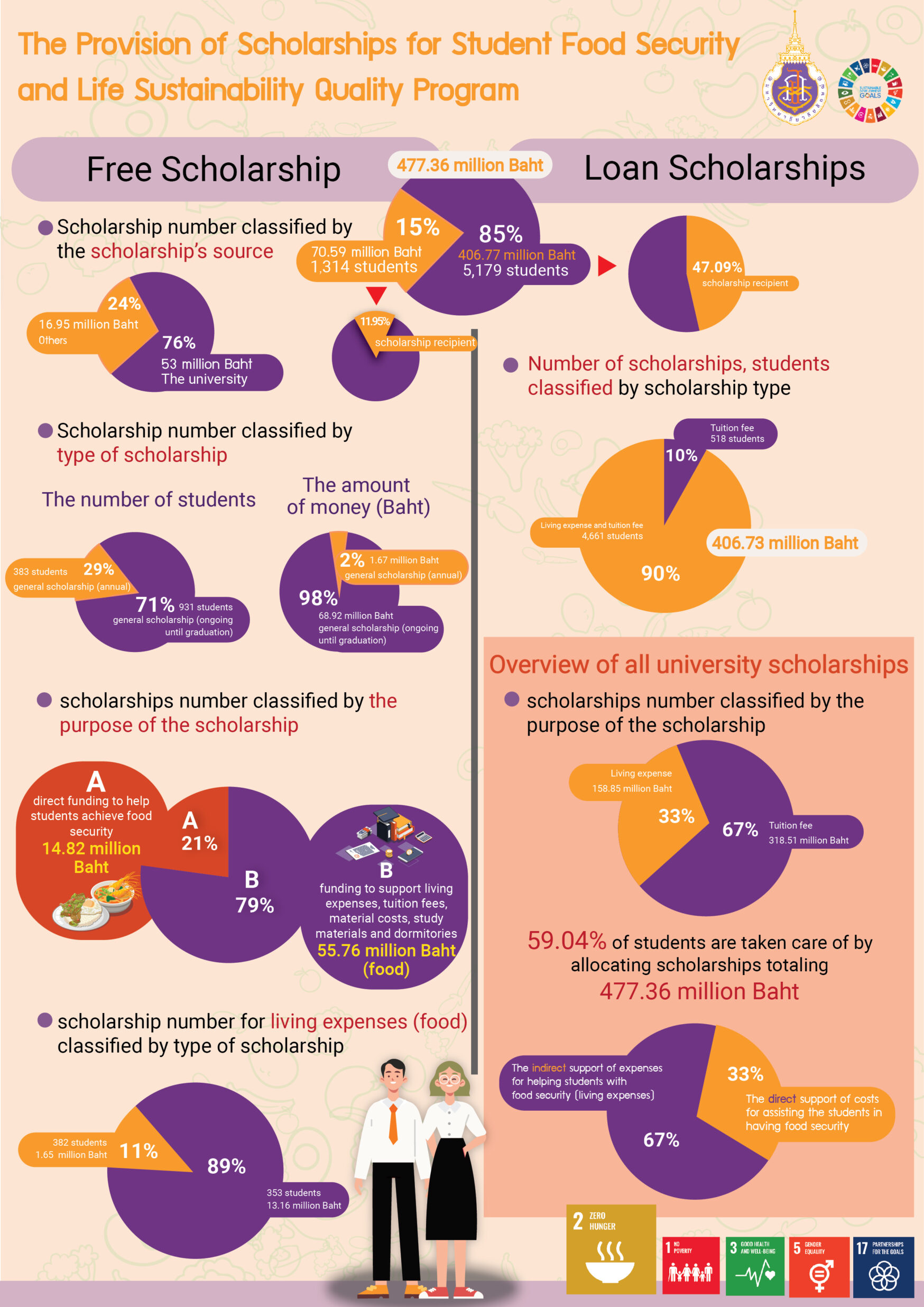The Provision of Scholarships for Student Food Security and Life Sustainability Quality Program

Walailak University awards scholarships to provide students with a sufficient budget to maintain a good-quality life. This program supports students financially, particularly those facing financial constraints, to ensure they have funding for their food security, education, and daily expenses. Sources of funding are from both the university’s budget and various external donors, including government, private sector, and community. Additionally, the program offers scholarship advice. It also monitors, and evaluates the performance of scholarship recipients with two main schemes:
1) Scholarships Without Repayment
Walailak University gives general scholarships, which are those that do not require students to repay. These scholarships are granted to financially disadvantaged students or students with excellent academic performance to support them throughout their studies, ensuring they can complete their education without dropping out due to financial constraints. In the 2022 academic year, a total of 1,314 students received these scholarships out of a total student population of 10,999, which represents approximately 11.95% of the entire students (In this regard, some students may receive more than one scholarship.). The total scholarship funding amounted to 70,592,137 Baht, with the majority being university-funded, accounting for 76%. To address students’ financial challenges, the university also allocated 24% of the scholarship funding from external sources, including faculty members, alumni, companies, foundations, stores, associations, and individuals. Walailak University can provide scholarships to eligible students based on the criteria and intentions of donors. The full amount of scholarship is illustrated in Figure 1.

Figure 1 Scholarship amount classified by the scholarship’s source.
The allocation of scholarships by Walailak University includes both annual and continuous scholarships until graduation. Based on scholarship allocation data for the year 2022, it is evident that the university places a significant emphasis on promoting students continuously.
The scholarships provided to 1,314 students are divided into continuous scholarships for 931 students, accounting for 71% of all scholarships. The remaining 29% consists of annual scholarships for 383 students.
These scholarship programs aim to provide students with educational stability, ensuring they can confidently pursue their studies to completion by covering tuition fees and sustaining their livelihood throughout their university education, as illustrated in Figure 2.


Figure 2 Scholarship number classified by type of scholarship types
This scholarship program can also be divided into two groups based on scholarship purposes: 1.) Support on tuition fees, accounting for 79% of the total scholarship funding 2.) Support for living expenses, food, study materials, and accommodation costs, representing 21% of the total scholarship funding, as illustrated in Figure 3.

Figure 3 Scholarship amount classified by the purpose of the scholarship purposes
From the information above, it is evident that direct support for ensuring students’ food security has been allocated through scholarship funding for living expenses. Food security is a critical factor for sustaining livelihoods. In 2022, general scholarship funding (annually) specifically for living expenses was allocated to 382 students, amounting to 1,655,700 Baht. Furthermore, general scholarship funding (continuous until graduation) for living expenses was allocated to 353 students, amounting to 13,168,200 Baht. This program addresses the issue of students lacking financial resources for food, helping them alleviate hunger. A significant portion of these scholarships is provided continuously until graduation, making up 89% of the total, while a smaller portion is awarded annually, representing 11%, to ensure that students have confidence in maintaining their livelihood and accessing food, as illustrated in Figure 4.

Figure 4 Scholarship amount for living expenses classified by type of scholarship types
Although this type of scholarship, accounting for the majority at 79% of all scholarships, is aimed primarily at assisting with tuition fees and learning materials because promoting education is the university’s priority, it can indirectly relate to food security, particularly for those in need. This means that by supporting tuition fees, accommodation costs, and learning materials, students can use the allocated funds to alleviate the financial burden on their parents or families for food expenses. As the university already provides support for tuition fees, some students may receive additional funds for food and increased livelihood expenses, ensuring food security and access to adequate nutrition.
2) Student Loan Scholarships
Walailak University manages a student loan fund provided by the government to support students. These funds aim to assist young individuals with limited financial resources to pursue equal educational opportunities. Students are granted loans that they repay after completing their education.
In 2022, these scholarships benefited a total of 5,179 students, which is 47.09% of the total student population. The allocated budget was approximately 406,733,577 Baht, with 65% going toward tuition fees and the remaining 35% for living expenses. Students can borrow 3,000 Baht per month if their family’s income does not exceed 360,000 Baht per year. If the family’s income exceeds this threshold, students are only eligible for borrowing the tuition fees, as depicted in Figure 5.

Figure 5 Number of scholarships, students classified by scholarship types
To summarize, in the academic year 2022, Walailak University allocated scholarships in the forms of scholarships without repayment and student loan scholarships, totaling 477,365,714 Baht. This benefitted a total of 6,493 students, which constitutes 59.03% of the entire student population. Of this scholarship fund, 33% was allocated for direct food security support (living expenses), and 67% was designated to support students indirectly for food security. This commitment to scholarship programs has contributed to enhancing the overall quality and well-being of students and has been widespread in its impact (Figure 6).





Figure 6 The amount of tuition fees and living expenses classified by scholarship types
Goal 2: Zero Hunger
Goal 1: No Poverty
Goal 3: Good Health and Well Being
Goal 17: Partnerships for the Goals

